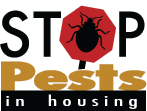- HOME
- » Frequently Asked Questions
- » Why do residents not cooperate or maintain a clean and clutter-free home?
Why do residents not cooperate or maintain a clean and clutter-free home?
Fear of the PMP or other staff discovering illegal activity
Pest control staff must gain and maintain the trust of residents. Staff should be viewed as helpers, not tattlers. Property managers need to be specific about what the PMP should note on each unit service report. Focus on protecting the health and safety of residents. In addition to reporting pest infestation levels and recommendations, PMPs should report life-threatening hazards.
Fear of pesticide risks
Residents who do not allow access because they don’t want their home “sprayed” or “bombed” can be your greatest allies in getting the community to rally around IPM. Show up with a HEPA vacuum to indicate you are doing something different. Talk with these residents about their concerns. Make sure they know:
- You will never “bomb” and no longer use sprays against cockroaches.
- If there are no pests, PMPs will not apply pesticides. PMPs always inspect and replace monitors before treating.
- Nontoxic methods are available.
Cannot afford cleaning supplies including a vacuum
- Residents can purchase cleaning supplies at a dollar store. Distribute copies of the Cleaning Supply Shopping List.
- Consider offering incentives for residents who go through an IPM or housekeeping training.
- Carry and hand out coupons for vacuums and other supplies.
Do not know how to do their part, were never taught how to clean or use a vacuum, or cannot understand preparation instructions
The same information can be presented in a variety of formats. Plan to use at least two for each message. Examples of delivery formats include printed materials, one-on-one coaching, and group training.
Religious customs involve leaving out food offerings
Residents who come from other countries or housing situations may practice rituals that involve food offerings. Often, rituals must be adapted for living in multifamily housing—putting shrines in closets, keeping sacrificial animals in homes, and placing items in waterways. The best way to enact change is to partner with local spiritual leaders and have them suggest adaptations to the rituals that will not contribute to pest problems.
Transitioned from a large home into a small dwelling unit with all their possessions
Residents should decide for each item whether to keep and organize it, throw it away/recycle it, or donate it. The goal is for everything to be organized in a way that the PMP can inspect the places where pests may hide. If a resident has a lot of “clutter,” the risk of a pest hiding is greater. Thus it is even more important that the resident of a cluttered home keep food and water away from pests.
Cannot do their part because of a mental or physical limitation
Residents who don’t cooperate may have handicaps that prevent them from doing their part. Vision problems make pest inspection hard, and physical limitations may make cleaning and organizing impossible. Depression, hoarding, and other mental conditions can lead to mistrust and uncooperative behavior. Dr. Christiana Bratiotis went into this further in her presentation at the 2011 National Healthy Homes Conference. To learn more about hoarding visit www.masshousing.com/hoarding, or read “IPM in the home of someone with hoarding.”
An inability to maintain the dwelling unit in accordance with housekeeping standards or inability to prepare a unit for treatment can be an early warning sign for an issue that can’t be ignored. Reach out to friends, family, faith-based organizations, non-profits, and health professionals to get these residents the help they need and deserve.
Used to living with problems and cannot envision a better way—don’t believe that staff and contractors will do their part
Residents with this outlook will not be early adopters of IPM practices, but once they see management and maintenance making efforts and repairs and they hear of neighbors benefiting from IPM, they may come around. You may have to do the majority of the work at first, but once someone goes a night pest-free, they’ll often do their part to keep it that way.
Other priorities
A single parent with multiple jobs and many kids may have housekeeping at the bottom of the priority list. Or perhaps the resident simply doesn’t care. You must speak to these residents one-on-one and motivate them to do their part. Maybe having fewer asthma attacks is a motivator? Give residents a reason why they should, instructions on how to, and a chance to change their ways. If you don’t get cooperation, fall back on lease enforcement. Sometimes the notice with specific instructions on what can be done to remedy is the only way to motivate change.
